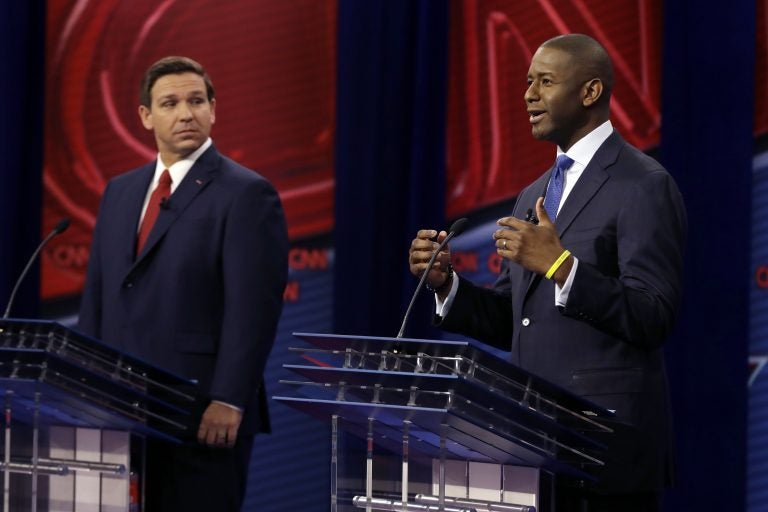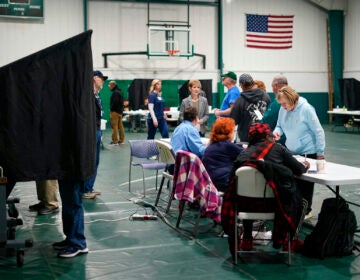Trump, racism, polarization: As Florida goes, so goes the nation
Pay close attention to the Florida gubernatorial race, because it is a proxy for our nationally polarized political climate.

Florida Democratic gubernatorial candidate Andrew Gillum, right, speaks as Republican gubernatorial candidate Ron DeSantis looks on during a CNN debate, Sunday, Oct. 21, 2018, in Tampa, Fla. (AP Photo/Chris O'Meara)
Pay close attention to the Florida gubernatorial race, not just because a black person might actually be elected to run a state for only the third time in American history, but because the race is a proxy for our nationally polarized political climate.
The frenzied clash between Andrew Gillum (black, outspokenly progressive) and Ron DeSantis (white Trumpist) was featured last night in a CNN-televised debate that confirmed William Butler Yeats’ poetic warning that “the center cannot hold.” Is there a centrist meeting ground anymore? Maybe so, on an ad hoc basis. But none was evident on that Florida stage, in the nation’s largest swing state, where politics is typically turbulent and the margins of victory are often miniscule.
The vibe in Florida is us versus them, resistance versus Trumpists – and never the twain shall meet. Each candidate played to his base, without apology or olive branch to the opposition. At one point – this was my favorite moment – DeSantis was asked whether he believes that Donald Trump is a good role model for children. That question was a tad tricky for DeSantis, because (a) he needs a hefty turnout from the state’s Trump acolytes, (b) DeSantis himself is an ardent Trumpist who airs a TV ad that shows him building a border wall with toy blocks, and (c) Trump’s track record of serial lying, serial misogyny, serial trash talk, and serial worship of foreign tyrants makes it hard for anyone to laud him as a role model.
But DeSantis is a seasoned politician (an ex-congressman), so he did what seasoned politicians often do: He fled the question with all deliberate speed. In response, he said that Trump had made good on his promise to move the U.S. embassy in Israel to the city of Jerusalem.
Um. Say what?
Moderator Jake Tapper followed up: “The question was whether or not he thinks President Trump is a good role model for the children of Florida.” DeSantis still had nothing to say beyond his reference to Jerusalem, which was surely aimed at locking down the roughly 25 percent of Jewish voters who are hawkish on Israel and lean conservative. But Gillum, currently the mayor of Tallahassee, took DeSantis’ dodge and ran with it. Does Gillum believe that Trump is a good role model? His response: “No, he’s not. Donald Trump is weak, and he performs as all weak people do. They become bullies, and Mr. DeSantis is his acolyte. He’s trying out to be the Trump apprentice.” Those remarks were surely aimed at stoking turnout among the Trump-detesting Floridians who have given Gillum modest leads in numerous polls.
Trump loves DeSantis – indeed, Trump’s endorsement prior to the GOP gubernatorial primary helped propel DeSantis to the nomination – and although it would be a stretch to suggest that DeSantis has been playing the race card to stoke turnout among white Trumpists, surely we can all agree that, at bare minimum, it was a sloppy slip of the tongue for DeSantis to say, on his first day as GOP nominee, that Floridians shouldn’t “monkey this up” by electing Gillum. Last night, when asked about that remark, he said that he fought next to black people as a Navy officer and he offered this rote vow: “I’ll be a governor for all Floridians.” (For what it’s worth, Trump on his election night promised: “I will be a president for all Americans, and this is so important to me.”)
Gillum had a few things to say about that “monkey” remark, and he didn’t mince words. That itself was somewhat surprising, given America’s long aversion to electing black governors. Voters have only hired two: Doug Wilder in Virginia 28 years ago, and Deval Patrick in Massachusetts 12 years ago. There has never been a Deep South black governor unless we count P. B. S. Pinchback, who was appointed to govern Louisiana in the Reconstruction era of 1872. He lasted 36 days.
Three African-Americans are actually in the running this year – Gillum, Stacey Abrams in Georgia, and Ben Jealous in Maryland – a rare occurrence that’s can be attributed to grassroots Democratic fury over the Trump GOP’s hostility toward minorities. Gillum was the surprise beneficiary in Florida’s Democratic gubernatorial primary, and last night he proudly trumpeted his racial orientation. That’s unusual. Black candidates running in statewide offices typically downplay that factor, in pursuit of swing centrist voters. But since there’s apparently no center anymore, it’s all about stoking his base – which is heavily African American, young, and white liberal.
Here was Gillum: “The ‘monkey up’ comment said it all, and he has only continued in the course of his campaign to draw all the attention he can to the color of my skin. And the truth is, you know what? I’m black. I’ve been black I’ll my life and as far as I know, I’ll die black.” He hit the race theme a second time when DeSantis asked him whether someone had given him free tickets to see “Hamilton” on Broadway. (There’s an FBI probe of political corruption in Tallahassee, although Gillum is reportedly not a target.) Gillum’s response to DeSantis: “I don’t take free trips from anybody. I’m a hard-working person. I know that may not fit your description of what you think people like me do, but I’ve worked hard for everything that I’ve gotten in my life.” (Italics are mine.)
There was much more, of course. My other favorite moment came when DeSantis, who has not released a health care plan, vowed to protect the coverage of people with preexisting medical conditions – after having repeatedly voted in Congress to sabotage Obamacare, which protects the health coverage of people with preexisting medical conditions. But you get the gist, and the core question is obvious: Which version of America will Florida give us on Nov. 6? And what will the swing state’s results suggest about where we may be heading?
WHYY is your source for fact-based, in-depth journalism and information. As a nonprofit organization, we rely on financial support from readers like you. Please give today.




